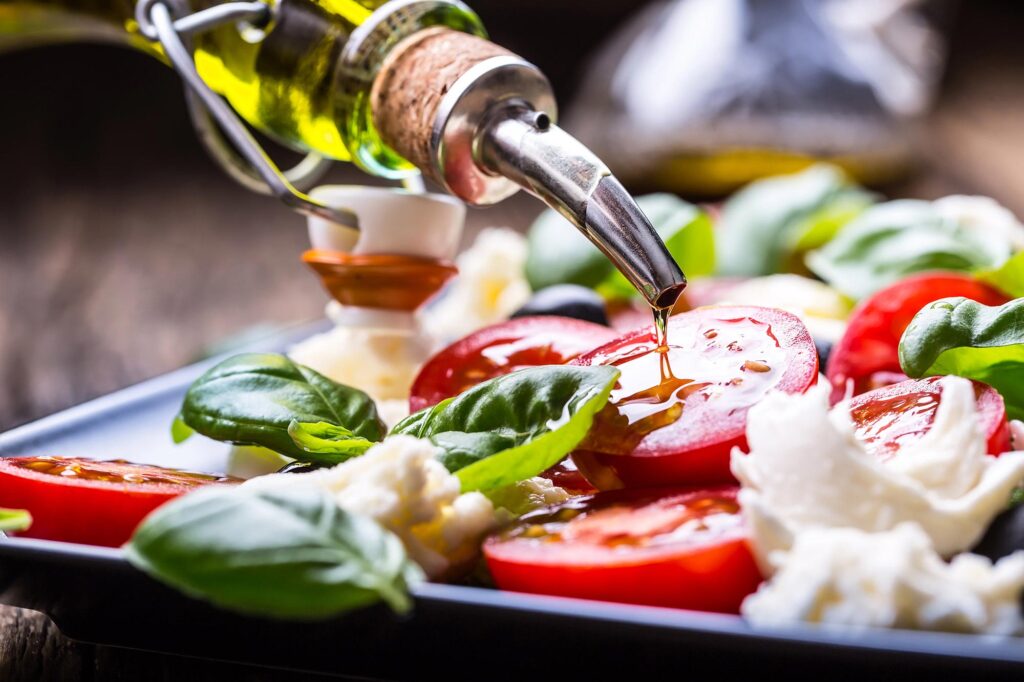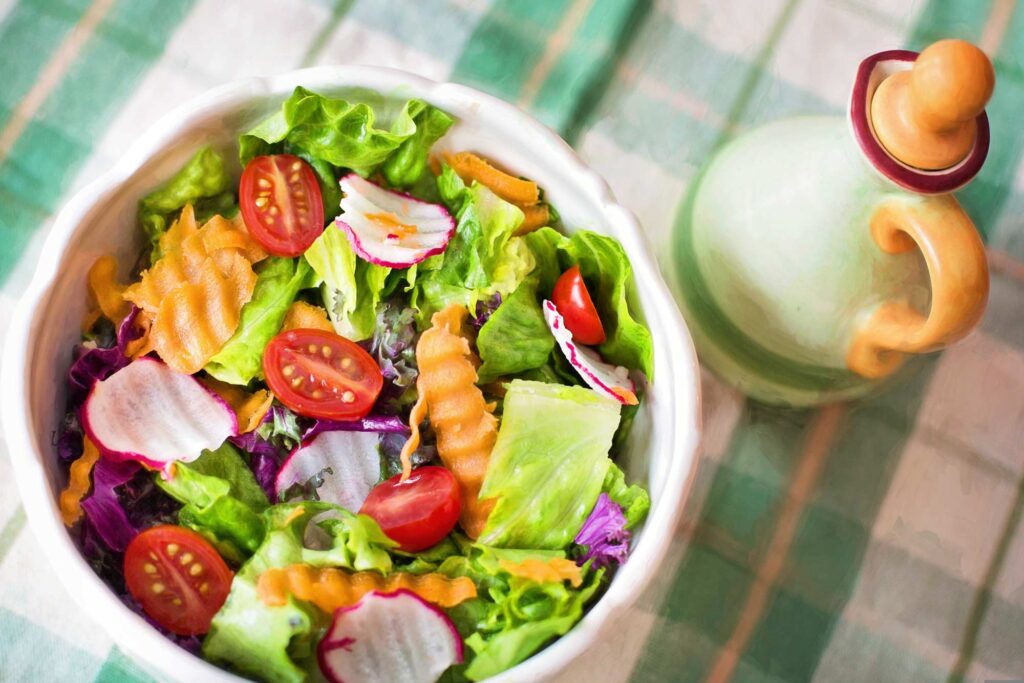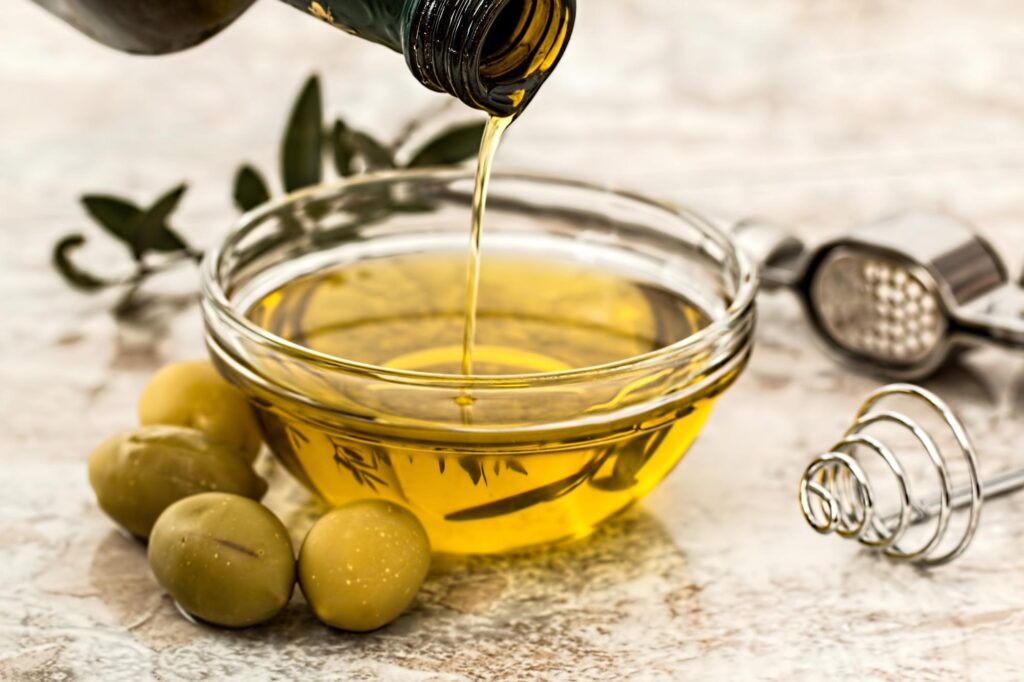Mediterranean diet and olive oil,
a perfect combination for health

The perfect synthesis of a diet handed down for generations in our Country, the Mediterranean diet has extra virgin olive oil as its first fundamental pillar. Its countless nutritional properties make it an essential element of an healthy, balanced diet. Let us see below what is meant by the ‘Mediterranean diet’, what benefits it can provide and how it is inextricably linked to extra virgin olive oil.
What is meant by 'Mediterranean diet'?
The word ‘diet’ might mistakenly imply a diet of deprivation. In reality, the term encapsulates a balanced set of food choices that are healthy for body and mind.
In the case of the Mediterranean diet, we are talking about a model inspired by the lifestyles of the populations around the Mediterranean Sea basin, namely Italy, Greece, Spain, Morocco and the South of France. These areas, despite having their own unique peculiarities, share the use of fresh seasonal fruit and vegetables, cereals, pulses and extra virgin olive oil, in stark contrast to the culinary traditions found in Northern Europe.
The model was first defined in 1960 by Ancel Keys, who wanted to understand the reasons why areas bordering the Mediterranean had a low incidence of cardiovascular and gastrointestinal diseases, concluding that their diet was mainly responsible for these positive effects. He then encapsulated these eating habits into a single nutritional system, effectively coining the term ‘Mediterranean diet’.
In 2010, confirming Keys’ research, UNESCO finally inscribed the Mediterranean diet among the ‘intangible cultural heritages of humanity’. The motivations refer in particular to the uniqueness of the model from an anthropological point of view, as a traditional system based on sharing a meal, safeguarding cooking techniques and respect for the seasonality of the products consumed.
The pillars of the Mediterranean diet
The entire dietary regime is fundamentally based on the consumption of foods of vegetable origin, to be enjoyed as part of a natural, poor diet that promotes physical well-being. The Mediterranean tradition also promotes respect for the seasonality of the products of the earth in order to ensure the well-being of man and nature.

The fundamental principles on which the Mediterranean diet is based can be summarised as follows:
- Prevalence of plant food consumption
- Respect for seasonality and consumption of fresh products
- Abundant consumption of fruit and vegetables
- Richness of cereals and legumes
- Daily use of extra virgin olive oil
- Absence of sweetened drinks for the benefit of wine consumption as an alternative to water
- Moderate and occasional consumption of animal products
Benefits and nutritional properties
Numerous scientific studies have confirmed that choosing to adopt the Mediterranean diet as a way of life is an excellent way to ensure both physical and mental well-being.
In fact, it has been shown that this typical Mediterranean diet is particularly effective in preventing and fighting numerous diseases linked to the eating style of our times, which is often rich in processed, industrially processed foods, but above all rich in saturated fats and poor in nutrients.
The functional foods found in the Mediterranean diet play a key role and each is able to bring positive effects in numerous areas of safeguarding our health. The great presence of monounsaturated fatty acids such as the oleic acid found in extra virgin olive oil, vegetable dietary fibre and the antioxidants in which wine, fruit and vegetables are rich are in fact among the properties that make this diet extremely effective in terms of preventing various diseases. Specifically, we are talking about problems such as:
- Cardiovascular diseases such as hypertension, arteriosclerosis or stroke
- Some types of tumours
- Diabetes
- Cholesterol and triglycerides
- Numerous types of autoimmune diseases
The relevance of extra virgin olive oil in the Mediterranean diet
Extra virgin olive oil fits into the Mediterranean diet as the beating heart of the whole model and is the main source of fat to be combined with other foods.
Its characteristics and peculiarities make it an element capable of bringing numerous beneficial effects to our organism. Let us take a look at the most relevant properties that make extra virgin olive oil the foundation of the Mediterranean diet:
- The high concentration of polyphenols such as hydroxytyrosol, tyrosol, oleacin and oleocanthal, in addition to their main antioxidant function, exert an important anti-inflammatory effect on the body. They are also mainly responsible for the typical ‘spicy’ flavour of the oil and ensure greater palatability and digestibility.
- Rich in vitamin E, extra virgin olive oil is able to fight the formation of free radicals, thus counteracting processes related to cell ageing, carcinogenesis, liver damage and arteriosclerosis.
- The monounsaturated fatty acids in which extra virgin olive oil is rich are an excellent way to prevent and combat various cardiovascular diseases by increasing HDL (‘good’) cholesterol and reducing LDL (‘bad’) cholesterol.
- It is confirmed that certain properties of this food can improve glucose metabolism, reducing the risk of certain forms of diabetes.
Not just a condiment
When we speak of extra virgin olive oil, we cannot reduce it to a simple condiment to go with food. On the contrary, it is good to understand how it should be seen as an ingredient capable of enhancing the aromas and flavours of the foods on which it is used. Thanks to its relative chemical stability, extra virgin olive oil can indeed tolerate high temperatures, reaching a smoke point (temperature above which burning occurs) of 210° C. Unlike other types of oil, this peculiarity makes it suitable to be subjected to different cooking methods, each of which can give the final dish unique flavours and aromas:

- Uncooked, it enhances the taste and aromas of the food on which it is poured
- Sautéing creates an outer patina, intensifying the flavours of the dish while maintaining the properties of the cooked food
- In the oven, the abundance of oleic acid makes it the ideal ingredient from which to extract vegetable fat, making food more succulent and healthier
- When grilled, it creates a special film that prevents the food from sticking when placed in contact with the embers and also softens the drier parts of the food.
- In frying, thanks to its resistance to high temperatures, it does not produce toxic reactions. On the contrary, it forms a layer around the food, preventing the absorption of too much oil and retaining the flavour of the food.
Finally, it must be stressed that it is essential to pay attention to the quality of the product purchased. In fact, it is good to remember to choose only quality extra virgin olive oil, milled according to the right timing and temperature, and above all from a controlled chain of selected olives. Only in this way will you be able to benefit from the great properties of extra virgin olive oil, safeguarding your health and palate.

